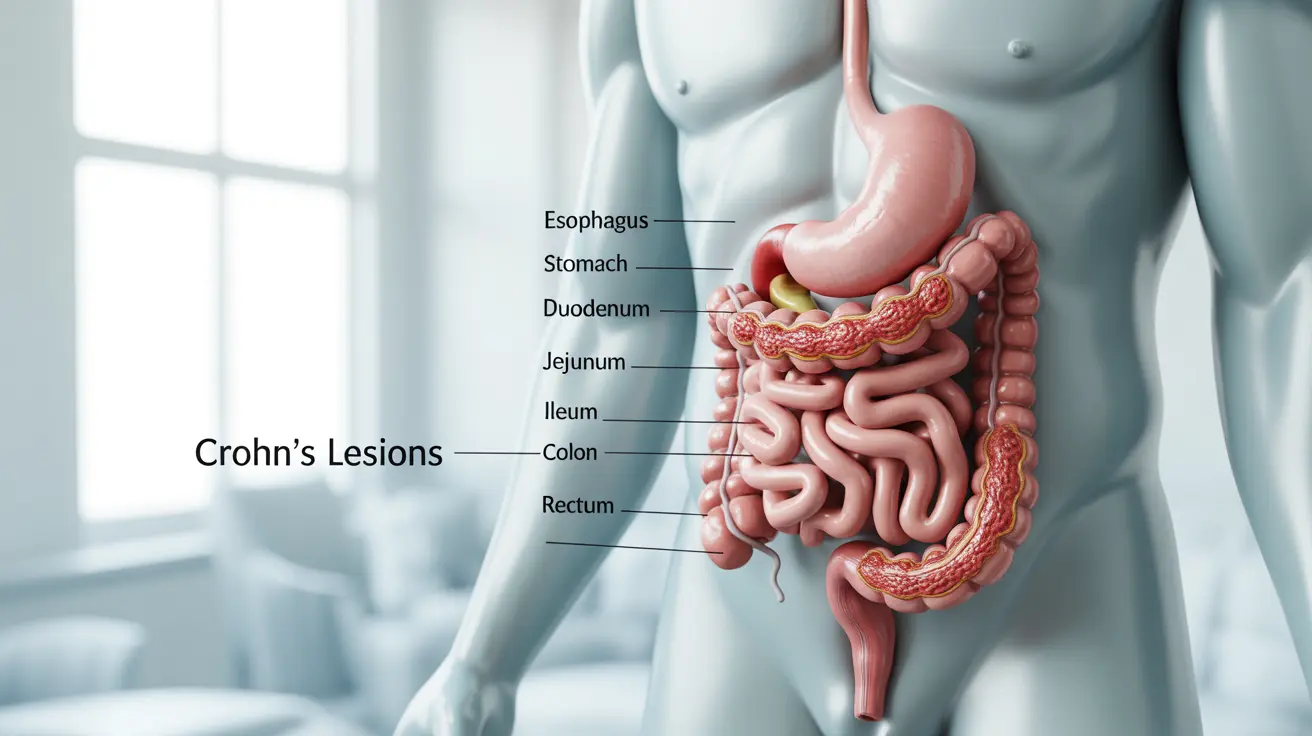Crohn's disease is a complex inflammatory bowel disease (IBD) that affects millions of people worldwide. This chronic condition can cause inflammation anywhere along the digestive tract, from the mouth to the anus, though it most commonly affects the small intestine and the beginning of the large intestine. Understanding its symptoms, treatments, and management strategies is crucial for those affected by this condition.
While Crohn's disease presents significant challenges, modern medicine offers various effective ways to manage symptoms and maintain quality of life. This comprehensive guide explores everything you need to know about Crohn's disease, from recognizing early warning signs to understanding treatment options.
Understanding Crohn's Disease Symptoms
Recognizing the symptoms of Crohn's disease is crucial for early diagnosis and treatment. Common signs include:
- Persistent diarrhea
- Abdominal pain and cramping
- Fatigue
- Unintended weight loss
- Reduced appetite
- Blood in stool
- Fever
These symptoms can range from mild to severe and may come and go in periods of flare-ups and remission. Some people might also experience symptoms outside the digestive system, such as joint pain, skin problems, or eye inflammation.
Causes and Risk Factors
While the exact cause of Crohn's disease remains unknown, researchers believe several factors contribute to its development:
- Genetic predisposition
- Environmental triggers
- Immune system dysfunction
- Microbiome imbalances
Risk factors that may increase the likelihood of developing Crohn's disease include family history, smoking, age (most commonly diagnosed before age 30), and living in urban or industrialized areas.
Treatment Approaches
Treatment for Crohn's disease typically involves a combination of approaches:
Medications
Several types of medications can help control inflammation and manage symptoms:
- Anti-inflammatory drugs
- Immune system suppressors
- Antibiotics
- Biologics
- Pain relievers
Dietary Management
Diet plays a crucial role in managing Crohn's disease symptoms. While there's no single diet that works for everyone, common dietary recommendations include:
- Avoiding trigger foods
- Eating smaller, more frequent meals
- Staying hydrated
- Following a low-residue diet during flares
- Working with a registered dietitian
Surgical Intervention
Sometimes, surgery becomes necessary when medications and lifestyle changes aren't sufficient. Surgical procedures may be recommended to:
- Remove damaged portions of the digestive tract
- Close fistulas
- Drain abscesses
- Repair strictures
While surgery isn't a cure, it can provide significant symptom relief and help manage complications.
Living with Crohn's Disease
Managing Crohn's disease extends beyond medical treatment. Lifestyle modifications can help improve quality of life:
- Stress management techniques
- Regular exercise when appropriate
- Adequate rest
- Smoking cessation
- Building a support network
Frequently Asked Questions
What are the most common symptoms of Crohn's disease and how can I tell if I might have it? The most common symptoms include persistent diarrhea, abdominal pain, fatigue, and unexplained weight loss. If you experience these symptoms consistently, consult a healthcare provider for proper evaluation and diagnosis.
What treatment options are available for managing Crohn's disease and can it be cured? While there's no cure for Crohn's disease, various treatments can effectively manage symptoms, including medications, dietary changes, and sometimes surgery. Treatment plans are typically personalized based on symptom severity and disease location.
How can I adjust my diet and nutrition to help manage Crohn's disease symptoms? Work with a registered dietitian to identify trigger foods and develop a personalized nutrition plan. Common strategies include eating smaller meals, staying hydrated, and avoiding problematic foods during flares.
What causes Crohn's disease and are there ways to reduce my risk of developing it? The exact cause isn't known, but genetics, environment, and immune system factors play roles. While you can't completely prevent Crohn's disease, not smoking, maintaining a healthy lifestyle, and managing stress may help reduce risk.
When do people with Crohn's disease need surgery, and what are the risks and benefits? Surgery may be necessary when medications aren't effective, or complications develop. Benefits include symptom relief and improved quality of life, while risks include potential surgical complications and disease recurrence.




